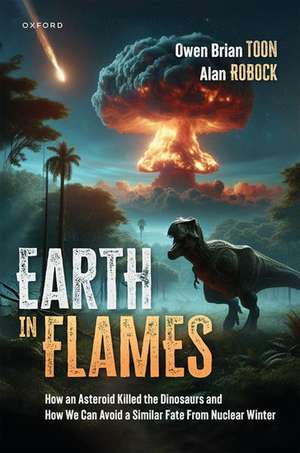Earth in Flames: How an Asteroid Killed the Dinosaurs and How We Can Avoid a Similar Fate From Nuclear Winter
Autor Owen Brian Toon, Alan Robocken Limba Engleză Hardback – 15 iul 2025
Preț: 157.42 lei
Preț vechi: 179.15 lei
-12% Nou
Puncte Express: 236
Preț estimativ în valută:
30.12€ • 32.82$ • 25.38£
30.12€ • 32.82$ • 25.38£
Carte nepublicată încă
Doresc să fiu notificat când acest titlu va fi disponibil:
Se trimite...
Preluare comenzi: 021 569.72.76
Specificații
ISBN-13: 9780197799703
ISBN-10: 0197799701
Pagini: 264
Dimensiuni: 156 x 235 mm
Editura: Oxford University Press
Colecția OUP USA
Locul publicării:New York, United States
ISBN-10: 0197799701
Pagini: 264
Dimensiuni: 156 x 235 mm
Editura: Oxford University Press
Colecția OUP USA
Locul publicării:New York, United States
Notă biografică
Owen Brian Toon is a Professor in the Department of Atmospheric and Oceanic Sciences and the Laboratory for Atmospheric and Space Physics at the University of Colorado at Boulder. He is a Fellow of the American Meteorological Society, the American Geophysical Union and the American Association for the Advancement of Science, and winner of AGU's Roger Revelle Medal, and AMS's Carl-Gustaf Rossby Research Medal. He was recognized by the United Nations Environmental Program for contributing to the U.N.'s 2007 Nobel Peace Prize for Climate Studies, and co-won the Future of Life Institute Award in 2022 for the discovery of Nuclear Winter.Alan Robock is a Distinguished Professor of climate science in the Department of Environmental Sciences at Rutgers University. He graduated from the University of Wisconsin, Madison, in 1970 with a B.A. in Meteorology, and from the Massachusetts Institute of Technology with an S.M. in 1974 and Ph.D. in 1977, both in Meteorology. Before graduate school, heserved as a Peace Corps Volunteer in the Philippines. He was a professor at the University of Maryland, 1977-1997, and the State Climatologist of Maryland, 1991-1997, before coming to Rutgers in 1998. Prof. Robock was a Lead Author of the Fifth Assessment Report of the Intergovernmental Panel on Climate Change.
